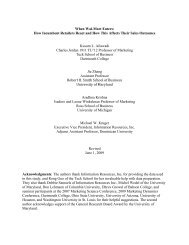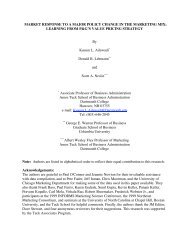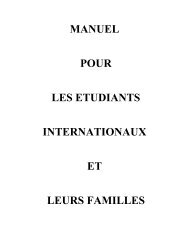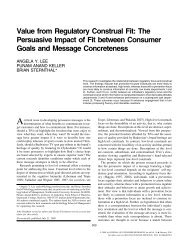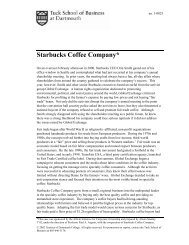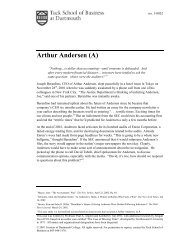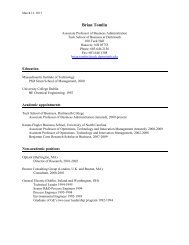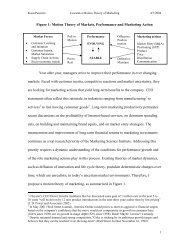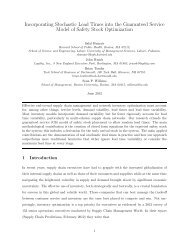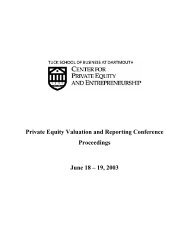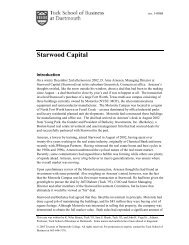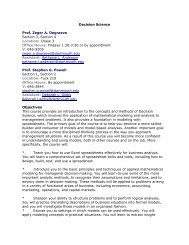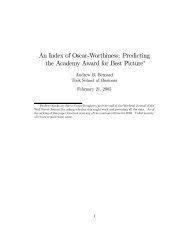tax notes international - Tuck School of Business - Dartmouth College
tax notes international - Tuck School of Business - Dartmouth College
tax notes international - Tuck School of Business - Dartmouth College
Create successful ePaper yourself
Turn your PDF publications into a flip-book with our unique Google optimized e-Paper software.
He added that he doesn’t believe firms routinely discount<br />
current <strong>tax</strong>es across the board.<br />
Leisenring also said the proposal created a ‘‘fundamental<br />
difference’’ from U.S. generally accepted accounting<br />
principles during the ongoing convergence<br />
project with the U.S. Financial Accounting Standards<br />
Board.<br />
An agenda paper prepared for the meeting <strong>notes</strong><br />
that FASB’s Financial Accounting Standard No. 109,<br />
‘‘Accounting for Income Taxes,’’ does not include a<br />
specific requirement or prohibition regarding the discounting<br />
<strong>of</strong> current <strong>tax</strong>.<br />
Leisenring took issue with the proposal’s also failing<br />
to note the differences between U.S. GAAP and what<br />
the IASB was considering. ‘‘It’s just so frustrating to<br />
work on convergence projects and have these lastminute<br />
180s come up, and it’s no wonder we don’t get<br />
things done,’’ he said.<br />
‘‘I do not think this is worth it during a project that<br />
is complicated enough,’’ Leisenring said. The IASB has<br />
said its current project to reduce the differences between<br />
IAS 12 and FAS 109 will lead to an exposure<br />
draft <strong>of</strong> an <strong>international</strong> financial reporting standard to<br />
replace IAS 12 by early 2009 and to a final standard in<br />
2010.<br />
Norway<br />
♦ Thomas Jaworski, Tax Analysts.<br />
E-mail: tjaworsk@<strong>tax</strong>.org<br />
Government Proposes Carryback Rule<br />
For Losses<br />
The Norwegian government on January 26 presented<br />
a NOK 20 billion (about $2.93 billion) ‘‘crisis<br />
package’’ that includes <strong>tax</strong> proposals that would allow<br />
companies to carry back losses in 2008 and 2009 and<br />
would expand the research and development credit.<br />
Norway has not been hit hard by the global financial<br />
crisis, but the government is concerned about rising<br />
unemployment levels. Unemployment is expected<br />
to reach 4 percent this year, a small number by <strong>international</strong><br />
standards but high by Norwegian standards.<br />
<strong>Business</strong> and opposition politicians are disappointed<br />
that the package does not contain more <strong>tax</strong> reductions,<br />
but the government has concluded that most <strong>tax</strong> reduction<br />
proposals are expensive compared with the number<br />
<strong>of</strong> jobs they create. Therefore, most <strong>of</strong> the package’s<br />
money would go to municipalities, public works,<br />
and environmental investments.<br />
The most important <strong>tax</strong> proposal would grant companies<br />
a carryback for losses in 2008 and 2009. Under<br />
NORWAY<br />
the ordinary rules, such a carryback is granted only<br />
when the <strong>tax</strong>payer’s business is terminated. Under the<br />
proposal, companies with pr<strong>of</strong>its in previous years,<br />
back to 2006, but losses in 2008 and/or 2009 would be<br />
granted the deduction earlier — perhaps much earlier<br />
— than under the ordinary carryforward rules, immediately<br />
increasing cash flow. However, the proposed<br />
rules would apply only to losses up to NOK 5 million<br />
for each <strong>of</strong> the income years 2008 and 2009. There is<br />
no rule regarding consolidated companies belonging to<br />
the same group, so presumably, one cap <strong>of</strong> NOK 5<br />
million would apply to each company <strong>of</strong> a group. The<br />
rules would also apply to a nonresident company doing<br />
business in Norway through a branch.<br />
To avoid complicated recalculations <strong>of</strong> <strong>tax</strong>able income<br />
and <strong>tax</strong>es for earlier years, the rule is technically<br />
framed as a cashing out in 2009 and/or 2010 <strong>of</strong> 28<br />
percent <strong>of</strong> the losses sustained in 2008 and/or 2009, to<br />
the extent that these losses do not exceed the <strong>tax</strong>able<br />
pr<strong>of</strong>its <strong>of</strong> 2006 to 2008. The 28 percent reflects the<br />
company <strong>tax</strong> rate for all the relevant years. As a consequence,<br />
the right to carry forward losses from 2006 to<br />
2008 is reduced by the same amount as the losses in<br />
2008 and 2009, the <strong>tax</strong> value <strong>of</strong> which has been cashed<br />
out.<br />
The revenue loss, and the corresponding cash flow<br />
for the companies, is estimated to amount to NOK<br />
3.25 billion in 2008 and a similar amount in 2009.<br />
However, because the rules imply that losses to be carried<br />
forward to later years are correspondingly reduced,<br />
future <strong>tax</strong>es would increase.<br />
The other <strong>tax</strong> proposal would raise the cap on the<br />
R&D <strong>tax</strong> credit. Currently, <strong>tax</strong>payers can claim an income<br />
<strong>tax</strong> credit <strong>of</strong> 20 percent <strong>of</strong> costs for R&D (and<br />
have the difference cashed out if the credit exceeds the<br />
calculated <strong>tax</strong>es) if the project is accepted by the Norwegian<br />
Research Council. The cap would be raised<br />
from NOK 4 million to NOK 5.5 million for the company’s<br />
own research and from NOK 8 million to NOK<br />
11 million for a project carried out by a research institution.<br />
This proposal would reduce <strong>tax</strong> revenue, and<br />
increase the relevant companies’ cash flow, by NOK<br />
180 million in 2009. Unlike the loss carryback proposal,<br />
this proposal is not limited to 2009 and 2010.<br />
♦ Frederik Zimmer, Department <strong>of</strong> Public and<br />
International Law, University <strong>of</strong> Oslo<br />
TAX NOTES INTERNATIONAL FEBRUARY 2, 2009 • 401<br />
(C) Tax Analysts 2009. All rights reserved. Tax Analysts does not claim copyright in any public domain or third party content.



